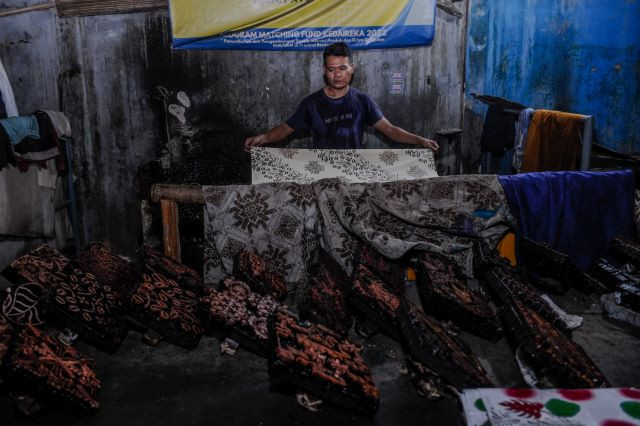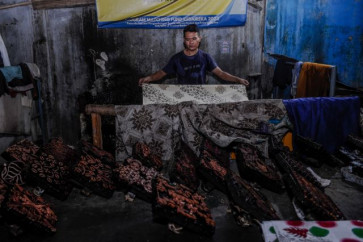Popular Reads
Top Results
Can't find what you're looking for?
View all search resultsPopular Reads
Top Results
Can't find what you're looking for?
View all search resultsBridging Indonesia's financial inclusion gap: Innovations for the unbanked
One solution to bridging the financial inclusion gap in Indonesia is ICS, which enables lenders to assess a loan applicant's creditworthiness through nontraditional data points, like utility payments and e-commerce transactions.
Change text size
Gift Premium Articles
to Anyone
 Art of production: An artisan draws a special Lebak batik motif on Nov. 8, 2023 at the Chanting Pradana gallery in Lebak regency, Banten. The Cooperatives and Small and Medium Enterprises (SMEs) Ministry will accelerate disbursement of soft loans to help SMEs withstand the global economic slowdown. (Antara/Muhammad Bagus Khoirunas)
Art of production: An artisan draws a special Lebak batik motif on Nov. 8, 2023 at the Chanting Pradana gallery in Lebak regency, Banten. The Cooperatives and Small and Medium Enterprises (SMEs) Ministry will accelerate disbursement of soft loans to help SMEs withstand the global economic slowdown. (Antara/Muhammad Bagus Khoirunas)
F
inancial inclusion has been an increasingly pressing issue in Indonesia over the last decade. The country has made progress, but 90 million adults are still not served by banks or similar financial services institutions. This is an alarming gap in financial inclusion, leaving millions trapped in poverty.
Financial inclusion is therefore imperative, as it empowers people to build economic security. For Indonesia to truly prosper, no one can be left behind.
According to the World Bank (2022), financial inclusion is critical to reducing extreme poverty. By providing accessible financial services to the unbanked while expanding access to lending services for individuals and micro, small and medium enterprises (MSMEs), we can bring vulnerable groups into the formal economy.
However, Indonesia’s MSME financing gap, defined as loan needs currently unfulfilled by formal lending institutions such as banks, is approximately US$165 billion, according to the International Monetary Fund.
Although MSMEs accounts for 99 percent of all businesses in Indonesia, they only represent 18.5 percent of all bank lending. In this situation, innovative financial technology (fintech) can bridge this gap and unlock economic opportunities for the unbanked.
Lower-income individuals and MSMEs have difficulty obtaining loans from banks and other financial institutions, due to a lack of credit history, collateral and formal income documents. In fact, lower-income individuals and MSMEs are more likely to work in informal sectors and do not have documented incomes and substantial assets that can be used as loan collateral.
At the same time, lenders face challenges in tapping the unbanked. With limited data available on such potential borrowers’ credit history, they struggle to properly assess loan applications from this group.


















